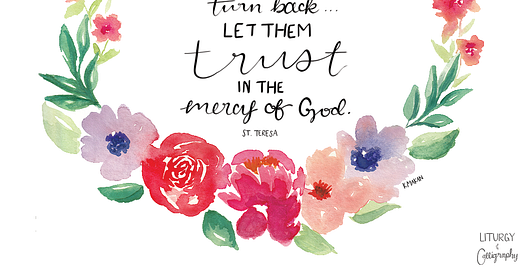Saint Teresa of Avila
A Brief Background
Teresa was born in 1515 in Spain and while she didn’t have quite as many siblings as Saint Catherine, she still had eleven! She was sent to a convent school when she was sixteen, because her father felt she was too lively and attractive. She became a nun at age twenty.
It wasn’t until Teresa was almost forty, after reading Augustine’s Confessions, that she experienced a renewed fervour for God after years of complacency. She wrote many books, including an autobiography called Her Life, and her most well known book, The Interior Castle. She led a reform of her monastic order and died at age sixty-seven.1
Our Moral Compass
For many years, Teresa viewed small sins, (perhaps the “little white lies” of her time) as harmless. Eventually she came to understand that intentionally committing small sins was significantly hindering her relationship with God.
She acknowledged the destructive nature that small sins can have, writing,
It seems to me a sin is very deliberate when, for example, one says: “Lord, You see it and I know you do not want it, and I understand this; but I want to follow my whim and appetite more than your will.” It doesn’t seem to me possible that something like this can be called little, however light the fault.2
God has given us a moral compass to instinctively know the difference between right and wrong, along with his word and Holy Spirit to guide us, yet we look for ways to twist the truth to fulfill our selfish desires.3
Simplicity and Humility
Thankfully, Teresa offers us advice on how to combat this attitude, based on her own spiritual journey. She advises,
I give you one counsel; that you don’t think that through your own strength or efforts you can arrive, for reaching this stage is beyond our power; if you try to reach it, the devotion you have will grow cold. But with simplicity and humility, which will achieve everything, say: Your will be done.4
We have a responsibility over our actions and choices, but we also recognize that we cannot do it without God’s strength and help. When we recall those last four words, “your will be done,” we are uniting our hearts and desires with Christ. We are reminded of his final moments in the garden before his ultimate sacrifice and it is through his sacrifice that we are able to say “your will be done” in the first place.
Instead, “confidence must be placed in God.”5 When we get discouraged, Teresa tells us to always trust in the mercy of God:
Through the blood He shed for us I ask those who have begun to not let the war make them turn back…Let them trust in the mercy of God and not at all in themselves, and they will see how His Majesty brings them.6
Preparing Our Hearts
We must trust in the tender mercy of God and his strength as we align our will with his. How can we offer up our hearts in trust of his mercy today? How can we ask for his will to be done today?




